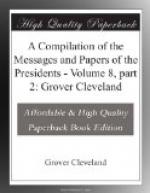JAMES MADISON.
APRIL 1, 1812.
To the Senate and House of Representatives of the United States:
Considering it as expedient, under existing circumstances and prospects, that a general embargo be laid on all vessels now in port, or hereafter arriving, for the period of sixty days, I recommend the immediate passage of a law to that effect.
JAMES MADISON.
APRIL 20, 1812.
To the Senate and House of Representatives of the United States:
Among the incidents to the unexampled increase and expanding interests of the American nation under the fostering influence of free constitutions and just laws has been a corresponding accumulation of duties in the several Departments of the Government, and this has been necessarily the greater in consequence of the peculiar state of our foreign relations and the connection of these with our internal administration.
The extensive and multiplied preparations into which the United States are at length driven for maintaining their violated rights have caused this augmentation of business to press on the Department of War particularly, with a weight disproportionate to the powers of any single officer, with no other aids than are authorized by existing laws. With a view to a more adequate arrangement for the essential objects of that Department, I recommend to the early consideration of Congress a provision for two subordinate appointments therein, with such compensations annexed as may be reasonably expected by citizens duly qualified for the important functions which may be properly assigned to them.
JAMES MADISON.
MAY 26, 1812.
To the Senate and House of Representatives of the United States:
I communicate to Congress, for their information, copies and extracts from the correspondence of the Secretary of State and the minister plenipotentiary of the United States at Paris. These documents will place before Congress the actual posture of our relations with France.
JAMES MADISON.
WASHINGTON, June 1, 1812.
To the Senate and House of Representatives of the United States:
I communicate to Congress certain documents, being a continuation of those heretofore laid before them on the subject of our affairs with Great Britain.
Without going back beyond the renewal in 1803 of the war in which Great Britain is engaged, and omitting unrepaired wrongs of inferior magnitude, the conduct of her Government presents a series of acts hostile to the United States as an independent and neutral nation.




